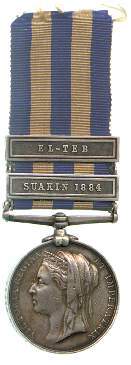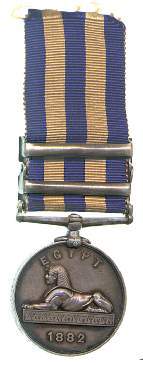Current Location: In storage
Maker(s)
Mint:
Birmingham
Artist:
Wyon, Leonard Charles
Artist:
Pinches, John
Ruler:
Victoria (1837-1901)
Ruler:
Victoria regina et imperatrix
(With the title of)
Entities
Categories
Description
Victorian-period Egypt was technically a dependency of the Ottoman Empire, but in fact the Khedive, Tewfik Pasha, was effectively in the hands of Britain and France, for whom control of the Suez Canal was a strategic necessity. Egypt's shaky economic situation endangering this, in 1879 Britain and France took over government in an arrangement of dual control. This foreign influence was much resented in Egypt, and especially within the army. A Colonel by the name of Ahmad Urabi (Arabi Pasha) became the spearhead of the movement, which launched a coup in 1882. After some international indecision this was suppressed by British arms, and this medal awarded to those involved.
The bars of the medal however relate to a later campaign, against Sheikh Muhammad Ahmad ibn al-Sayyid 'Abd Allah and his allies, who after the proclamation of Muhammad Ahmad as Mahdi (the legendary final redeemer of Islam) in 1881 threatened to remove the Sudan, technically an Egyptian possession, entirely from the Khedive's control. Several serious defeats of Egyptian forces in 1884 led to a concerted British campaign, which included battles at el-Teb and at the Red Sea port of Suakim against Beja rebels ("fuzzie-wuzzies", as the British called them) under Usman Digna. Neither battle was a lasting success and the British withdrew their forces to Egypt and Khartoum, prior to a planned withdrawal that in fact became impossible.
This medal was awarded to Gunner A. Chittle of the 6th Battalion, 1st Scots Division, Royal Artillery, for participation in the initial 1882 campaign, but he clearly fought in the 1884 campaign too. Lester Watson acquired his medal at some point before 1928.
Notes
History note: Gift of L. Hoyt Watson; ex Lester Watson Collection, acquired before 1928
Legal notes
Given by Lester Watson through Cambridge in America, 2009
Measurements and weight
Diameter: 36.1 mm
Weight: 43.38 g
Acquisition and important dates
Method of acquisition: Given
(2009)
by
Watson, Lester
Dating
1882
CE
-
1890
CE
Materials used in production
Silver
Techniques used in production
Struck
Inscription or legends present
Inscription present: Bust of Victoria facing left with veil
- Text: VICTORIA REGINA ET IMPERATRIX
- Location: Obverse
- Type: Design
Inscription present: Sphynx on pedestal facing left
- Location: Reverse
- Type: Design
References and bibliographic entries
Identification numbers
Accession number: CM.1218-2009
Primary reference Number: 141312
Watson Catalogue: 112
Ordering: M-0101
Previous object number: LW.0101
Stable URI
Audit data
Created: Saturday 6 August 2011
Updated: Monday 25 March 2024
Last processed: Wednesday 14 May 2025
Associated departments & institutions
Owner or interested party:
The Fitzwilliam Museum
Associated department:
Coins and Medals





